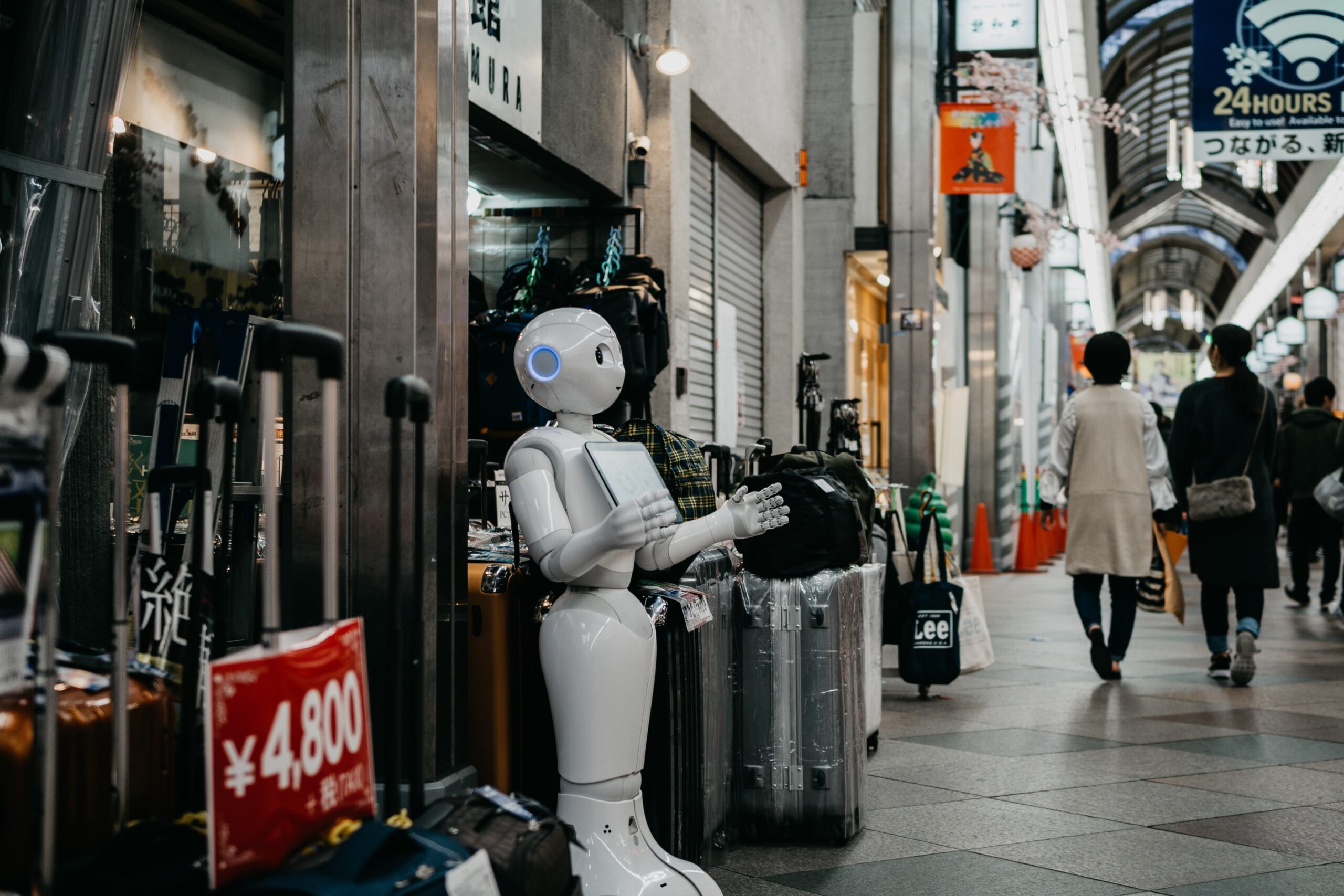Artificial Intelligence (AI) has a significant impact on society, both positive and negative. On the positive side, AI has brought many benefits to society, including improving healthcare, transportation, and education. AI has also created new job opportunities and increased productivity in various industries.
However, there are also potential negative impacts of AI on society. One of the concerns is job displacement, as AI has the potential to automate many jobs, which could lead to significant job losses in certain industries. Another concern is privacy and security, as AI relies on vast amounts of data to function, and there are concerns that this data could be misused or hacked, leading to privacy violations
Additionally, there are ethical concerns regarding the use of AI, such as algorithmic bias, which can perpetuate discrimination against certain groups. There are also concerns about the potential misuse of AI by governments and corporations, such as the use of AI for surveillance and control
So you’ve been hearing a lot about artificial intelligence lately. AI is transforming our world in ways both big and small. Self-driving cars, intelligent assistants, facial recognition – AI is powering technologies that were science fiction just a few years ago. But what exactly is AI and how is it changing our lives? This article will give you a crash course in AI and explore how it’s impacting society. From AI’s potential to boost productivity and economic growth to its risks around bias and job disruption, AI raises important questions about how we integrate this powerful technology into our lives. By understanding AI and its possibilities as well as its limitations, we can help ensure its responsible development and use. So let’s dive in and get up to speed on the basics of AI and what it means for our future.
What Is Artificial Intelligence?
Artificial intelligence or AI is the simulation of human intelligence processes by machines, especially computer systems. These processes include learning, reasoning, and self-correction. AI makes it possible for machines to learn from experience, adjust to new inputs and perform human-like tasks like recognizing speech, translating languages, and making decisions.
AI has been in development for decades, but recent advances in computing power and access to huge amounts of data have caused an explosion in applications. AI powers technologies like:
- Virtual assistants (Siri, Alexa, Cortana) that can understand speech and respond to questions.
- Image recognition software that can detect objects, scenes and faces in pictures.
- Self-driving cars that can perceive the environment around them and navigate roads.
- AI that plays complex strategy games like chess and Go at a superhuman level.
The impact of AI on society is huge and growing. AI has the potential to vastly improve areas like healthcare, transportation and education. However, it also brings risks and challenges like bias in data and algorithms, job disruption, and threats to privacy or even physical harm from autonomous weapons. The key is to develop AI responsibly and ethically, with safeguards and oversight in place to help ensure the benefits outweigh the costs as this transformative technology continues to advance.
Current Applications of AI in Society
AI is already deeply embedded in many areas of society. Let’s look at some of the major ways AI impacts our daily lives:
- Virtual assistants like Siri, Alexa and Cortana help us with basic tasks like setting reminders, controlling smart home devices and answering questions. They’re getting smarter all the time, but still have a way to go before achieving human-level intelligence.
- AI powers many of the technologies we use for transportation and navigation. Self-driving cars use computer vision, sensors and deep learning algorithms to perceive the environment around them and navigate roads. AI also helps power mapping and routing apps to get us where we need to go.
- AI plays a huge role in various industries, especially healthcare. AI systems can detect diseases, analyze medical scans, discover new treatments and even recommend diagnoses or courses of treatment for doctors to consider. AI will continue transforming healthcare and making it more accurate, efficient and personalized.
- Online services like Netflix, Facebook and Google use AI to analyze our data and preferences, then provide customized recommendations and tailored experiences. AI helps these companies understand their users better and deliver more relevant content and ads.
- AI fuels tremendous advances in fields like robotics, education, finance, agriculture, and more. Robots work alongside humans in factories, AI tutoring systems adapt to students’ needs, AI detects fraud and optimizes investments, and AI even helps farmers monitor crop health and optimize yields.
AI will undoubtedly continue to transform technology and society in exciting and profound ways. While progress brings both promise and peril, with responsible development and oversight, AI can be developed and applied for the benefit of humanity. The future is filled with possibilities.
The Future of AI: What’s Next?
AI has come a long way in a short time, but many experts think we’ve only just begun to scratch the surface of its potential. The future of AI promises to be an exciting era of rapid progress and innovation.
Smarter AI Systems
AI systems will continue to get smarter and expand into more areas of life. Self-driving cars, intelligent assistants, and AI that can generate images, music, and stories are just the beginning. AI has the potential to help solve complex problems like developing new medicines, accurately predicting natural disasters, and improving energy efficiency.
AI Becomes More Human-Like
AI may start to demonstrate more human-like qualities, known as artificial general intelligence. Systems could develop common sense reasoning, emotional intelligence, creativity, and self-awareness. Of course, this also introduces risks and ethical concerns that researchers are actively working to address. Regulations and guidelines will be needed to ensure the safe and fair development of advanced AI.
AI Integrated Into Our Daily Lives
AI will be integrated into more of our daily activities in seamless and helpful ways. Many routine tasks will be automated and personalized to our needs. AI assistants may become constant companions that know our preferences, daily schedules, and how to help us work more efficiently. However, we must be mindful of how much control we hand over to AI systems and set appropriate boundaries.
The future of AI is both promising and uncertain. With proper safeguards and oversight in place, AI can be developed and applied responsibly to improve lives, not diminish them. The key will be using AI to augment human capabilities, not replace them. By working with AI and not against it, we can build a better future with artificial and human intelligence working hand in hand.
How AI May Impact Jobs and the Economy
AI has the potential to significantly impact jobs and the economy. As AI systems get better at performing human tasks, many jobs are at risk of automation. However, AI will also create new types of jobs and boost economic growth.
Related Article : 10 benefits of technology development in life. you need to know
Job automation
Many routine jobs like cashiers, telemarketers, and assembly line workers are at high risk of automation as AI gets better at physical and cognitive tasks. This could displace many human workers. However, not all jobs will be automated. Creative jobs, complex jobs requiring emotional intelligence, and jobs involving unpredictable physical work will be much harder to automate.
New types of jobs
AI will also create new types of jobs, such as AI engineers, robot programmers, and data scientists. Many existing jobs will change and require new skills as well. For example, teachers, doctors, and marketers will need to develop AI skills to enhance their work. There will be a strong demand for professionals who can build, apply, and manage AI systems.
Economic growth
While AI may significantly transform the job market and economy, many experts predict that it will ultimately boost economic growth. AI can help companies cut costs, increase productivity and innovation, and develop new products and services. This can increase profits, wages, and standards of living. However, the economic benefits of AI may not be evenly distributed across sectors, income levels, and regions. Proactive policies and programs may be needed to provide opportunities for workers to develop skills that complement AI.
AI will bring both opportunities and challenges to jobs and the economy. With proper management and policies, AI can boost economic growth and create new opportunities, though its impact may be uneven. Workers and students will need to develop skills to work with AI, and companies must thoughtfully integrate AI to benefit both businesses and employees. Overall, AI will significantly transform our economy and job market, but human judgment, creativity, and empathy will remain invaluable.

FAQ: Common Questions About AI Answered
AI is advancing rapidly, but many misconceptions and unanswered questions remain about this powerful technology. Here are some of the most frequently asked questions about AI, answered.
What exactly is artificial intelligence?
AI refers to computer systems designed by humans that can perform tasks normally requiring human intelligence. AI systems use machine learning algorithms and neural networks to learn directly from data, identify patterns, adapt and make decisions with minimal human input.
Will AI take over the world?
While advanced AI continues to get more capable, human-level AI does not currently exist and we are still quite far from developing systems that match human intelligence, creativity, emotional intelligence and general knowledge. Researchers are actively working to ensure any advanced AI systems of the future are grounded and aligned with human values.
What are the benefits of AI?
AI has the potential to vastly improve many areas of life and society. Some of the major benefits of AI include:
- Automating dangerous and repetitive tasks.
- Improving healthcare diagnostics and treatment.
- Optimizing energy usage in homes and transportation.
- Enhancing education and lifelong learning.
- Improving accessibility for people with disabilities.
- Optimizing business processes and workflows.
What jobs will AI take over?
Many routine jobs are at high risk of automation from AI and robotics. This includes jobs like data entry clerks, telemarketers, cashiers, and assembly line workers. However, AI is also creating new types of jobs, such as AI engineers, robot programmers, and data scientists. Many existing jobs will also change and adapt to work alongside AI systems. The jobs least at risk are those requiring social and emotional skills, creativity, and complex problem-solving.
How can I prepare for the rise of AI?
Some of the best ways to prepare for the increased use of AI include: developing skills that AI struggles with like creativity, emotional intelligence, critical thinking, and complex problem solving; learning technical skills to work with AI systems; staying up-to-date with AI technologies and trends; and advocating for policies and practices that ensure AI’s safe, fair and ethical development.
Conclusion
So there you have it, a quick overview of AI and how it’s shaping the world around us. The future is hard to predict, but one thing is clear – AI will continue advancing and transforming life as we know it. While progress brings both promise and peril, the key is ensuring the responsible development of AI. That means designing AI systems that are fair, transparent and aligned with human values. If we’re thoughtful and intentional, AI can enhance and improve our lives in so many ways. But we have to be proactive and help guide its development. The future is unwritten, so let’s make it a good one. AI is here to stay, so we all need to do our part to understand it and apply it for the benefit of humanity. The robots aren’t taking over just yet, but they are changing the game. AI – it’s something worth understanding.






